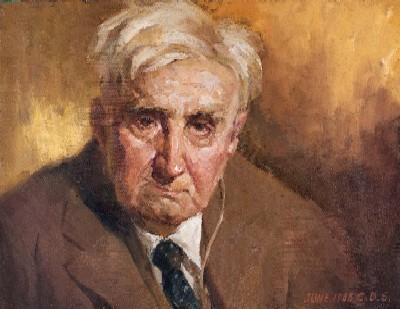A Love of Music


“History is a nightmare from which I am trying to awake.” – Ulysses by James Joyce.
The words of poet Stephen Dedalus in Joyce’s novel are spoken in the historical moment of 1904 Dublin, a time which to our contemporary eyes appear halcyon days of dulcet and pacific calm. The full horror of history which the 20th Century was about to unfold, though foreshadowed, lay at least a decade into the future. Still, the comment raises a central issue facing every working artist: the effect of one’s historical period and the events within it upon the psyche and the creative output of the artist.
Certainly the history of the 20th Century (which continues unaltered into our current millennium) appears particularly nightmarish, unprecedented in scope and intensity. One need only mention the mass slaughter of two World Wars, the increased mechanization of life and the corresponding atomization of the individual, the enslavement of the population under increasingly effective totalitarian regimes of State and Corporate power, the increased alienation from Nature disintegrating the ancient cultural links to past times and universes, and the explosion of technology that forms the alien and polluted environment in which the modern human lives and which threatens to end that existence on Earth, to see why some observers of the history of Western art of the 20th Century are led to comment that the art documented the collective mental breakdown of the Western psyche. The extent of that mental breakdown culminated, by mid-century, in the likelihood of destruction of the entire human species by all-out nuclear war. What had been neurotic and psychotic had reached the suicidal. “May you live in interesting times,” runs the familiar adage. All of us know by now that the statement is a curse.
Perhaps from our perspective of the increasing menace of the 21st Century, we take a kind of perverse pride in assuming that our particular “interesting times” are singularly bad, that no time in history has been as nightmarish. It is highly likely that humans living in other awful times of the past also considered their situation as uniquely horrifying: witness the almost unceasing proclamation of “The End Times” over the last 2,500 years every time the slightest crisis arose. Are our times any worse than those that saw the West invaded by Mongols, assaulted by Islam, and slain by the Black Death? One of the oddly comforting truisms of history is that despite all the horrors and nightmares, life goes on. Children are born, families are raised, work is done, art is created. The horrors of the Medieval Era did not stop the construction of the Gothic cathedrals; Napoleon’s conquering of Vienna did not halt Beethoven’s completion of the Eroica Symphony (though it did force him to change its dedication); the world-altering slaughter of World War I, which effectively destroyed an entire generation of Englishmen, did not prevent Ralph Vaughan Williams from composing his Pastoral Symphony and The Lark Ascending.
By the time of Stephan Dedalus’ plaint in 1904, Ralph Vaughan Williams was already 32 years old, had completed two symphonies, and had begun his deep study of English folk music and Tudor religious music. His long life (he died in 1958) and his equally long artistic career (he composed two symphonies in his 80’s) spanned the crucial turning points of the history of the West. Born during the zenith of the British Empire (1872), his life extended through the depths of that Empire’s disintegration, his death coming at the nadir of the Cold War (1958). Given the cultural and artistic history of his times one would expect jarring and anxiety-ridden disintegrative music, that hallmark which we usually call “Modern.” Yet Vaughan Williams was able to create works of utter and compelling beauty, works that transcend the historical limitations of the time of their composition. It has been said that Joyce (Vaughan Williams’ rough contemporary) wrote as if the world was well lost to Art. Vaughan Williams composed music as if the world was lost to Beauty.
The story goes that the inspiration for Vaughan Williams’ 3rd Symphony, thePastoral, was sparked during the depths of World War I, when Vaughan Williams, now in his mid-40’s and serving in the Ambulance Corps, would drive his ambulance up a ridge overlooking a valley to watch the sun set on the landscape. There he heard a distant bugler practicing his call and perhaps he also heard the wordless, feminine song of Nature that were to emerge in his Pastoral Symphony to such stirring effect. Certainly one is almost shocked that the horror of World War I, which murdered and brutalized an entire generation, could find such utterly beautiful and contemplative expression in Vaughan Williams’ symphony, a Pastoral that equals those of Beethoven and Sibelius. I have constantly returned to it, its spell undiminished even after 30 years of repeated listening. If there was ever an example of a creative artist transcending his times, of creating beauty from the ruins, Vaughan Williams is it.
The Lark Ascending, Vaughan Williams’ other work that spanned the World War, is similarly transcendent of its historical time, revealing a beauty and peace that never fails to move one to the depths and carry one to exalted and sublime heights. Moreover, it has this affect on everyone to whom I have ever played it, from 6-year old children, head-banging Heavy Metal enthusiasts, to people who swear that they don’t like Classical Music.
Vaughan Williams has been called the musical poet of the English countryside, the center of that English school of composers who sought inspiration in and attempted to give musical expression to the English landscape. Vaughan Williams’ deep connection to Nature permeates his music, even when the work is not strictly a tone poem named after a particular English locality. Everyone who speaks the English language partakes of the cultural tradition of that language, and senses, though perhaps subliminally, the landscape from which the language grew. It takes only a small leap of imagination for speakers of English (and especially those who are acquainted with its art and literature) who are not residents of England to find a spiritual kinship in the English countryside, whose spirit of place resonates so deeply and sympathetically throughout English culture. Though only occasionally spectacular and rarely overwhelming, the English landscape contains a subtle beauty that allows a sense of well-being and a sense of being at home, an understated sense of Nature and humanity evolving and changing hand in hand. The hand of history, of almost limitless depths of time, leads one throughout the land. Even at its most wild and most remote, Nature seems touched by the hand of man. The landscape is that eternal background upon which the scroll of time and history unfold, that island harbor surrounded by the sea, that genius locii that reveals its own eternal secrets to those who will listen.
The English landscape finds as deep an expression in Vaughan Williams’ music as it does in the literary works of Wordsworth, Thomas Hardy, and D. H. Lawrence; perhaps more so, since music is capable of depths of expression impossible to utter in words. Vaughan Williams captures the mood of the landscape often through long contemplative musical movements, subtly and delicately scored, suffused at times by that signature English melancholy that is so often a prelude to the realization of ultimate peace. Bombast is absent, as largely is dynamic climax, melodies are often built up of fragments based on the imagination of meditation, rather than the Classical patterns of formal logic.
Significantly however, the world of words appears in many of Vaughan Williams’ works: he wrote music based on the poetry of Shakespeare, Blake, Whitman and others in a variety of forms, from symphony, to masque, to choral works and song cycles. Even The Lark Ascending’s inspiration is sourced from a poem. The sung word and the effects obtained by mass singing are deeply rooted in his work. Some of his more contemplative scoring for woodwinds seems to have an almost choral-like quality, the individual instruments almost like individual singers. Despite the literary associations with some of Vaughan Williams’ music, it is not limited strictly to the programmatic. Vaughan Williams resisted a too-literal interpretation of his music: like the dimensional historical depth of the English landscape, his music operates on multiple levels, the strictly representational being only one. Even in such a seemingly literal work such as the transcendent The Lark Ascending, the lark serves as a metaphor, a jumping-off place for violin playing that is at heart ineffable. One need not know the title of this composition, nor its origin in a poem, to grasp the music and to be utterly moved by it.
There is no doubt that Vaughan Williams’ feeling for nature and the English landscape was reinforced by his deep study of English folk music. Like his contemporaries Bela Bartok and Zoltan Kodaly, Vaughan Williams collected folk songs in the countryside, preserving a extant musical tradition that was about to disappear. The immersion into European folk-music connects one to an ancient psychic universe, and to a musical language based on Modes, a language which Classical Music since roughly 1600 has largely ignored. Though he never quoted folk melodies directly in his symphonies, they do appear as almost subliminal templates, hinting rather than depicting. His Fantasia on Greensleeves, which does directly use two old folk songs, is perhaps emblematic of the sources of his inspiration; at least one of the sources claiming authorship of the ancient folksong Greensleeves was King Henry VIII.
Vaughan Williams’ deep involvement with the English ecclesiastical composers of the Tudor and Elizabethan periods (he served as Editor of The English Hymnal) was another source of his inspiration, both in theme and form. The Fantasia on a Theme by Thomas Tallis, Williams’ first recognized masterpiece (1910), draws from that transitional era of the English Reformation, the composition rooted in the ancient Phrygian mode, leading to a complex emotional intensity that seems to defy the later simplification of Western Music into the Classical Major/Minor scales. This modal language, used in many of Williams’ melodies, creates a new depth, and a different emotional dimension to the distinctive thread of English melancholy in his music. Melancholy alters from simple sadness, depression, despair, or desolation to reveal a new bittersweet dimension, a revelation that the sadness of life is not its ultimate and final meaning. The emotional complexity of his Modal musical language allows Williams’ to confront the “nightmare of history” unflinchingly, deeply aware that emotions cannot be distorted into simplistic dualistic frameworks. His language permits the expression of mutually exclusive, seemingly self-contradictory emotions simultaneously. Duality is penultimate, and thus, is never a final statement of reality, either of humans or of Nature. The illusion of duality seems to be the central theme of all truly great artists, as it is of mystics, and of the esoteric aspects of religion throughout time. Although Vaughan Williams was to write a goodly amount of ecclesiastic and religious music, he did so from a non-sectarian point of view, indeed one can scarcely call him a believer in the conventional sense. Like all great artists, Vaughan Williams understood the meaning behind religious symbols and creeds, and was able to utilize them creatively without the need of formal acceptance and submission to a creed.
Williams’ mastery of orchestration, which seems to have at least partly resulted from his studies with Maurice Ravel in 1908-9 is another hinge of Vaughan Williams’ inspiration, themes, methods, and musical language. The four works I’ve mentioned –Fantasia on Greensleeves, Fantasia on a Theme by Thomas Tallis, The Pastoral Symphony, and The Lark Ascending – (which happened to be the first works of my own initiation into the spell-binding world of Vaughan Williams’ music,) are as good an entry point as any to anyone wishing to experience his music. Not only are these individual works eminently beautiful on their own, they are also easily accessible and listenable. They open the listener to the rest of Vaughan Williams’ musical world. Though there are any number of excellent recordings of his music, the performances by Adrian Boult as conductor still stand out as primary, Boult having often performed the premieres of many of Williams’ works. Hugh Bean’s violin performance in The Lark Ascending (with Boult conducting) sets the standard for this wonderful piece of music. The LP record version’s second side, which mates the final movement of theSixth Symphony with The Lark is one of the grandest mood-building segues ever of the LP format. Perhaps the only exceptions for me are the Morton Gould performances of the Tallis and Greensleeves fantasias, which possess an emotional intensity that some other performances of these two works seem to lack.
Similarly, if there ever was an indisputable rationale for owning a highly neutral, true-to-timbre, and musically revealing audio system, the music of Vaughan Williams is surely it. Much of his music is subtle and full of dynamic nuance, the orchestration delicate and based on differing voices amidst the woodwinds, violins, and violas, and moving with a slow pulse that needs to be coherently tracked if it is not to disintegrate into unrelated fragments. The demands of the music also argue strongly for the ownership of a first-rate turntable: the CD format’s difficulty with timbre, subtle dynamic changes, nuance, and the maintenance of pulse can easily lead to fatal distortion of the music’s meaning. One need also mention the excellent recording quality of the many Boult performances (including the complete nine symphonies) on the English EMI label that mate beauty of recording with the music’s own inherent beauty as a further benefit of LP listening.
The desire to experience beauty has always been one of the primary motivations for listening to music, or experiencing any of the Fine Arts for that matter. It strikes me as singularly odd that the achievement of beauty as a central artistic goal has all but disappeared in writings about music and art in the last century. It appears that the very word ‘aesthetic’ is now a contradiction. Instead of beauty, we hear about “self-expression,” “solving technical problems,” “challenging and confronting the audience,” or promulgating an “ism,” be it psychological, political, or social. The creation and communication of beauty is not even mentioned. At their most insane, certain schools of thought deny that art has any meaning whatsoever, that the artist is oblivious of any ‘message,’ and that the only truly creative work is that of the critic, who de-constructs the work to reveal its social, cultural, political, and psychological conditionings and determinism. Ernest Hemingway once stated that a 100% accurate, completely fool-proof Bullshit Detector was essential for every writer. One is threatened with deafness as the Bullshit Detectors go off.
Still one wonders about this disappearance of beauty as a core achievement of a work of art. Is the world indeed lost to Beauty and to Art? The English writer Colin Wilson attempted to create an “existential criticism” of music in his Chords and Dischords, an essential tenet of which was that to be a great artist was also to be a great human being: that the quality of the artist’s vision of life and reality ultimately sets the limits to the greatness of the artistic creation. A deeply disturbing fact of the last forty or so years is the complete lack of the emergence of any artists that can even be considered major, if not, indeed, great. Where are our Mozarts, Joyces, Blakes, Turners, or Beethovens? Is their something peculiar about our own “ruins” that precludes the emergence of great artists?
Ralph Vaughan Williams is certainly a major composer: his sixty-plus years of compositional creativity resulted in nine Symphonies, five Operas, and an extensive number of works in a variety of musical forms. The fact that his historical life overlaps that of ours is significant: we share the same nightmare of history. That he was able to create works of beauty out of that nightmare of ruins that rival any artist in history leaves no doubt that he is indeed also one of the greatest. Those who hold the experience of beauty as a central meaning of life will certainly love his music; those attempting to awaken from the nightmare of history will surely find a path. Or, at least, a road sign.
![]()
![]()
Don’t forget to bookmark us! (CTRL-SHFT-D)
Stereo Times Masthead
Publisher/Founder
Clement Perry
Editor
Dave Thomas
Senior Editors
Frank Alles, Mike Girardi, Russell Lichter, Terry London, Moreno Mitchell, Paul Szabady, Bill Wells, Mike Wright, and Stephen Yan,
Current Contributors
David Abramson, Tim Barrall, Dave Allison, Ron Cook, Lewis Dardick, John Hoffman, Dan Secula, Don Shaulis, Greg Simmons, Eric Teh, Greg Voth, Richard Willie, Ed Van Winkle, Rob Dockery, Richard Doran, and Daveed Turek
Site Management Clement Perry
Ad Designer: Martin Perry





Be the first to comment on: A Love of Music